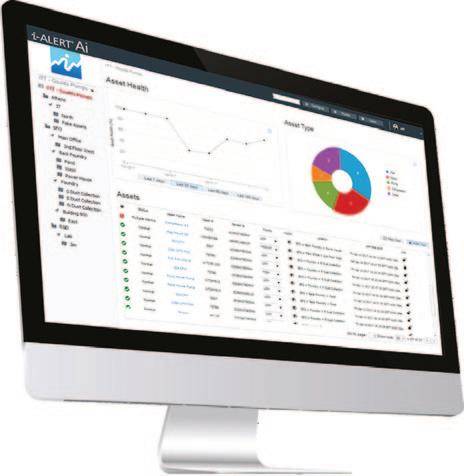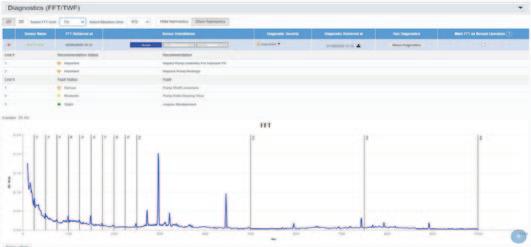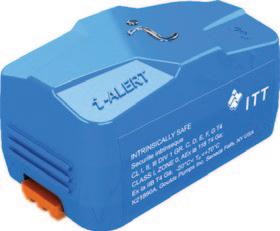
4 minute read
A full-suite solution for diagnostics and monitoring

With unpredictability at an all-time high, the need to stay agile, proactive and productive is great. The need to do so cost-efficiently is even greater. ITT i-ALERT is a total machine health monitoring ecosystem that improves plant reliability by enabling rotating equipment to run with less unplanned downtime.
A reliable, online solution to complement reliability/maintenance
Cost-effective entry to condition monitoring
Remote monitoring capability, integration to existing systems and predictive diagnostics

Proposal for a Regulation: Environmental performance of products & businesses – substantiating claims (PEF method)
Adoption of the PEF method by the Commission was expected for 30 November 2022 as part of the Circular Economy Package II, but it did not take place. Commission adoption is now planned for 22 March 2023, as part of the Consumers Package.
EU Ecolabel
Proposal for a Directive to empower consumers for the green transition.
On 25 January, the opinion of the European Parliament’s Committee of the Environment, Public Health and Food Safety (ENVI) on the European Commission’s ‘Empowering the consumers for the green transition’ initiative that amends the directives on unfair consumer commercial practices and on consumer rights was adopted.
One of the main proposed additions in the final opinion of the ENVI Committee is the requirement for companies making claims on future environmental objectives to have a specific implementation plan on how to achieve it, including information on milestones, budget and other factors.
As a reminder, the proposal aims at removing generic environmental claims on a product’s environmental performance that cannot be demonstrated via the EU Ecolabel or other existing national legislations.
The leading Committee on the file is the Internal Market and Consumer Protection (IMCO) Committee. In terms of next steps, the Parliament IMCO will vote on 27 March and the Council’s Working Party on Consumer Protection and Information held an exchange of views on 8 March including the Presentation of the Presidency compromise proposals.
Energy Efficiency Directive
On 10 March, MEPs and the Swedish presidency of the Council agreed on new energy saving targets in both primary and final energy consumption in the EU.
Member States should collectively ensure a reduction of energy consumption of at least 11.7% at EU level by 2030 (compared to the projections of the 2020 Reference Scenario). A robust monitoring and enforcement mechanism will accompany this objective to make sure Member States deliver on their national contributions to this binding EU target.
MEPs and the Council presidency also agreed on annual energy savings by Member States of 1.5% (on average) until 2030. The annual energy savings will begin with 1.3% in the period until the end of 2025 and will progressively reach 1.9% in the last period up to the end of 2030.
The targets should be achieved through measures at local, regional and national levels, in different sectors, such as in public administration, buildings, businesses and data centres. MEPs insisted that the scheme should in particular cover the public sector, which will have to reduce its final energy consumption by 1.9% each year. Member States should also ensure that at least 3% of public buildings are renovated each year into nearly-zero energy buildings or zero-emission buildings. The agreement also establishes new requirements for efficient district heating systems.
In terms of next steps, the provisional agreement will now have to be endorsed by both the Parliament and the Council.
Energy Performance of Buildings (EPBD)
On 14 March, during its Plenary meeting, the European Parliament adopted its position on the Energy Performance of Buildings Directive (EPBD) revision proposal of the European Commission with 343 votes for, 216 against, and 78 abstentions.
Some of the main points in the position of the Parliament include:
• All new buildings should be zero-emission from 2028, with the deadline for new buildings occupied, operated or owned by public authorities in 2026.
• All new buildings should be equipped with solar technologies by 2028, where technically suitable and economically feasible, while residential buildings undergoing major renovation have until 2032.
• Residential buildings would have to achieve, at a minimum, energy performance class E by 2030, and D by 2033 – on a scale ranging from A to G (for non-residential and public buildings 2027 and 2030 respectively).
• The national renovation plans include support schemes to facilitate access to grants and funding and ensure free of charge information points.
As a next step, with the Parliament and the Council of the EU having their official positions adopted, they will shortly enter trilogue negotiations, chaired by the Commission.
Energy Labelling Regulation
On 28 February 2023, the European Commission held a Consultation Forum meeting on the operational details for the functioning of the European Product Registry for Energy Labelling (EPREL) database.
During the meeting, the Commission and the stakeholders discussed the objectives, outline and provisional timeline for adoption and implementation of the implementing act setting rules. Furthermore, additional process and operational details were considered.
As a reminder, the EPREL database generates all Energy Labels based on the data that suppliers entered when registering their product models. Furthermore, consumers can find detailed information about energy labelled products and models covered in the database, to help them make informed purchasing decisions by identifying which products have the best cost-efficiency ratio for a specific need.
Revision of EU Emissions Trading Scheme
On 9 February, the European Parliament’s Environment Committee (ENVI) formally approved the interinstitutional agreements on the EU Emissions Trading System (EU ETS), as part of the ‘Fit for 55 package’ for which a political agreement was reached in December 2022.
The agreed texts will now be considered at a plenary vote on 17 April 2023 and, following approval, the work of the Parliament will be done. If the agreements are also approved by the Council, they will be ready to be published in the EU’s Official Journal and 20 days after that the legislation will enter into force.







